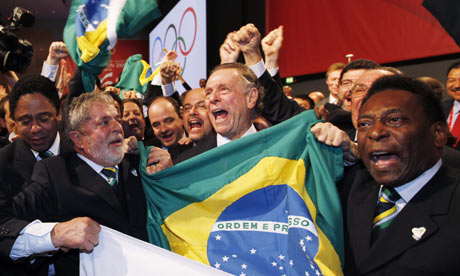In one of those commentaries, I argued that the local government should not be in the entertainment business. I wrote this in the context of Bakersfield's plan to spend gazillions on an arena. My point was that we do not have governments in order to entertain us, and that sports and arenas should be left to the market. Of course, given how much people love, love being entertained--no wonder Trump made it to the top with his reality entertainment--and given how much I am always on the losing side, well, ...
This is not a new position since graduate school. I was even more opposed to governments investing in entertainment back when I was a commie sympathizer. I was an undergraduate student when India hosted the Asian Games. Television was a new thing in our lives at that time; yet, I decided that I would boycott it. I did not watch even one minute of those games on TV. I could not, and still cannot, understand why the government would waste all that money on entertainment when there were far more urgent human problems everywhere in India. The only difference is that back then I did not articulate an argument that entertainment should come out of private spending.
Next month, it will be the mother of all sports entertainment--the Olympics. As I have done with the past events, I will boycott this too.
Those with money, who want to be entertained, have somehow managed to convince those without any money--who also like to be entertained--that investing gazillions of public money on all things sports is an economic investment with huge returns. One awesome bullshit that happens over and over again only because the unthinking people like to be entertained 24x7!
Any unbiased observer will tell you the same thing: You may as well dig huge holes, fill them with all the money you have, and pour concrete over them!
Economists are notorious for being unable to agree on anything. So it's striking that on the finances of the Olympics, they almost all agree.We have known from the Roman days that the best way to continue to screw the country is by distracting the people with mass entertainment. It is entertainment, not religion, that is the opium of the masses!
"Investing in the Olympics is not worth the investment," says Andy Zimbalist of Smith College.
"You build all these facilities that are perfect for the Olympics, that are not really as desirable once the circus leaves town," says Allen Sanderson of the University of Chicago.
"You end up with a very indebted city or host nation long after the confetti is cleaned up; someone has to pay the bills for it," says Bob von Rekowsky of Fidelity Investments.
I sometimes want to scream that people are idiots. Oops, did I say that? ;) Spending is simply not worth it to the taxpayers:
Spending lavishly on a short-lived event is, economically speaking, a dubious long-term strategy. Stadiums, which cost a lot and produce minimal economic benefits, are a particularly lousy line of business. (This is why they are usually built by taxpayers rather than by corporations.)Not difficult to understand. Corporations would have spent the money if they knew they were going to make more money than what they invested. They know a loser when they see stadiums, and they also see losers when they see taxpayers. They, therefore, get the loser taxpayers to build those loser stadiums!
And then there are reports like this:
There’s just a month to go before the Summer Olympics begin in Rio de Janeiro. And the bad news keeps coming.Or, this:
One Month Before The Olympic Games in Rio, Everything Is A DisasterSo, hey, enjoy this latest installment of taxpayer-funded debauchery, which will be from August 5th; I will be busy with my summer reading ;)
 |
| Source |




